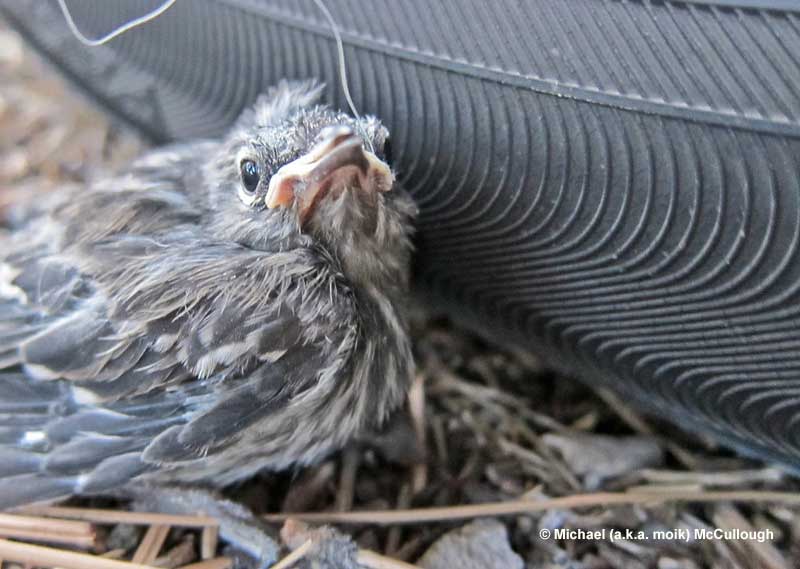
Anyone spending time in nature must have witnessed this heart-breaking scene – a seemingly abandoned baby bird on the ground, where it shouldn’t be, chirping and struggling to move, vulnerable as it gets. These chicks almost seem to beg you to take them home and raise them.
However, by doing that, you may actually be causing that baby bird harm. In many (if not most) cases, older bird babies can seem abandoned to our eyes but still actively be taken care of by their parents in reality. However, if the baby bird is too young, it definitely needs help getting back to its parents.
So, what’s the right thing to do when finding a baby bird?
Read on to find out.
On this page
Why Do Birds Fall Out Of Nests?
Baby birds can end up out of the nest for many reasons.
- Siblings or parents accidentally pushed it out of the nest. This one is pretty straightforward – accidents happen to everyone, including birds.
- Fleglings on the road to independence. The fledglings often leave the nest before they learn how to fly – and the situation pushes them to work on this skill faster. These fledglings remain near the nest, and parents feed and watch over them.
- Parents kicked them out on purpose. If the food supply is running thin and there are simply too many mouths to feed, parents will sometimes cull the brood by kicking out the presumably weakest chick.
- They were pushed out by a brood parasite. Brood parasites lay their eggs in another bird’s nest, and the parasitic chick commonly pushes its pseudo-siblings out of its own nest.
- A predator got them. Cats, squirrels, crows, and other predators can take a chick out of the nest and then be forced to leave their prey before getting a chance to devour it.
- The nest collapsed. Some birds are poor nest builders. The scarce twigs and branches are seldomly well-secured, causing the nest to fall apart.
- Human influence. Unfortunately, people in many places still do tree felling and radical branch pruning during the bird nesting season, causing the nests and chicks to end up on the ground.
Not all baby birds you find on the ground have fallen out of somewhere. Many birds are ground nesters. They are mostly found in fields and forests and rarely (if ever) in urban areas. Some common examples include pheasants, curlews, waterbirds, owls, and nightjars. If you find their chicks, you will likely find the nest on the ground as well – leave them alone and do not disturb them.
Nestling or Fledgling – What’s The Difference?
To understand what you’re facing and what the right thing to do is, you should be able to tell the rough age of the baby bird.
In altricial birds like songbirds, pigeons, corvids, cardinals, and many others, there are roughly three stages in bird chick development – hatchlings, nestlings, and fledglings. It is important to be aware of these in case you encounter an orphaned chick.
Nestlings (including hatchlings)
Nestlings are nest-sitters. Hatchling-nestlings have only recently hatched – their bodies are tiny and almost bare or covered in thin, fluffy down instead of feathers, and they can only move their heads to beg for food. Their temperature regulation is poor, and they fully rely on their parents to keep warm.
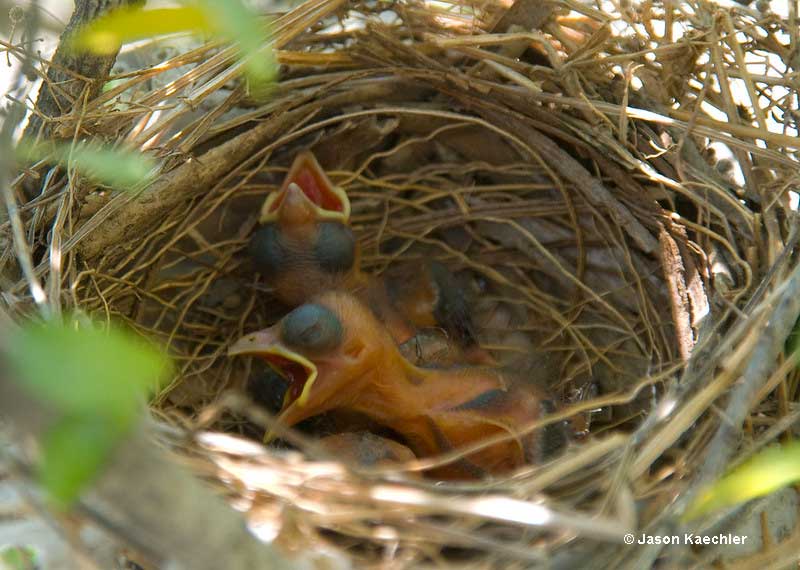
Older nestlings have open eyes, and their down is thicker and gradually replaced by adult feathers as they near the fledgling stage. Their temperature regulation is also developing, and siblings can huddle together to keep warm. However, they are still helpless and lost outside of the nest.
Nestling chicks end up on the ground by accident or an adverse factor and cannot survive on their own. It would be almost impossible for parents to care for them so extensively out of the nest because of their need for constant warmth.
Fledglings
Fledglings are “bird teenagers.” They have most of their adult feathers (with some fluff still poking out), can stand on their own, and move on their feet.
Fledglings practice flight, but the trick is that they commonly leave the nest just before learning to fly, leading people to assume they are helpless.
However, most of them can fly in short bursts when threatened, and even if not, they will be able to do so in no time.
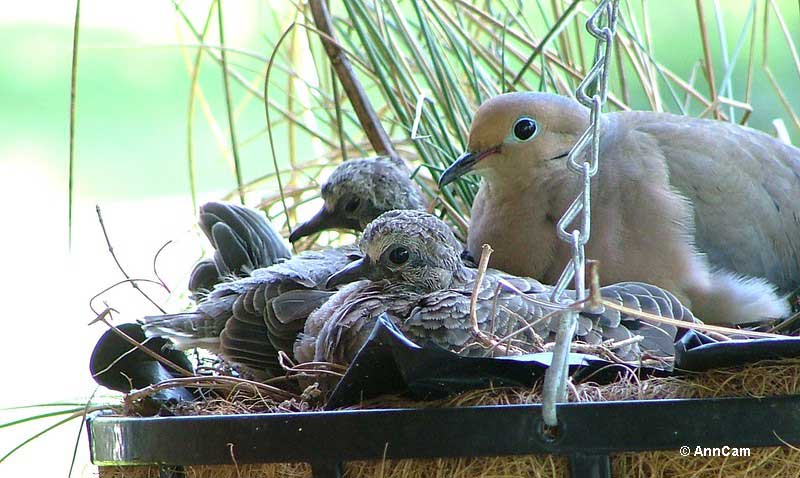
Fledglings are starting to look more like adults, and if you find one, it usually means it is taking its first steps toward independence.
At this stage, parent birds still take care of their young all the time – they feed them and guard them, but they don’t need to lie on the nest anymore. That means that fledglings are not “abandoned” in most cases, even if you see that they are alone at that very moment.
Precocial birds and their “independent” chicks
In precocial birds like chickens, peacocks, and waterfowl such as ducks and swans, there is no real “nestling” stage – chicks are able to move and forage on their own as soon as they hatch.
They follow their mothers around (on foot) and copy what to do to survive. Still, they are also covered in downy feathers, and it takes weeks for them to grow adult plumage and learn to fly – that is why they are as vulnerable and dependent on parental care despite not sitting on the nest. The older the chick is, the more likely it is to survive if abandoned.
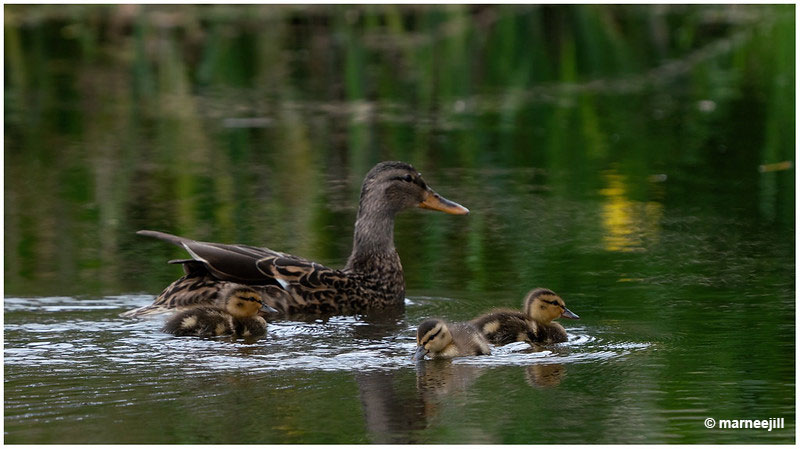
The Checklist – What To Do If You Find A Baby Bird
Here is a checklist of potential steps to take if you encounter an abandoned baby bird. What you do upon finding a baby bird highly depends on whether it is a nestling or a fledgling, so their age is the first thing to assess (see above).
Is the baby bird alive and alert?
First, you have to see if a chick is injured. If a nestling looks symmetrical, has no wounds, seems alert, opens its beak periodically, and lets out baby chirps, it is likely well. Healthy fledglings will be standing on their feet and calling out to their parents; they can also be calm if they’re hiding, but they will react in some way if disturbed and have bright, open eyes.
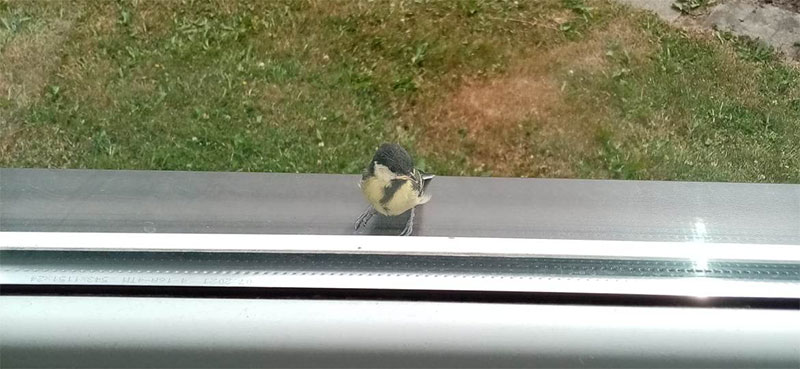
This particular youngling started chirping loudly and was most likely just making its first tries at flying.
As a general rule, avoid trying to pick up fledglings, which can scare their parents and make them reluctant to return to their chick. In the case of corvids, it can even trigger a protective attack on a well-meaning human! Handling nestlings is more acceptable since they are unlikely to be purposefully on the ground anyway.
Contact your nearest wildlife rescue and rehabilitation center if you see visible injuries on the baby bird. Even if you return it to the nest, it likely won’t survive. You can apply emergency care advice until you reach the rehabilitator. The vet would not be a first choice since not all vets know how to deal with wild animals.
Do you see a nest?
If you find yourself a nestling, you should check where its nest is. Holding the chick at this point is perfectly fine – your hands will give it much-needed warmth. Don’t worry – the parents won’t reject it if you handle it.
See more: Guide to bird nests & how to spot them
Spotting the nest can be difficult since they are well-hidden in most species. A nest could be an open, cup-shaped nest in a shrub or a tree or in a suitable cavity – look out for both. Adult bird activity can reveal the nest’s whereabouts, but it takes some observation (take cover to avoid scaring the birds).
Can you return a baby bird to its nest?
After you’ve spotted the nest, make plans on how to return the nestling there. Ideally, when parents leave the nest to avoid disturbing them (which could trigger nest abandonment). As said before, you shouldn’t worry about leaving a human scent – it doesn’t make a difference – but about a general disturbance.
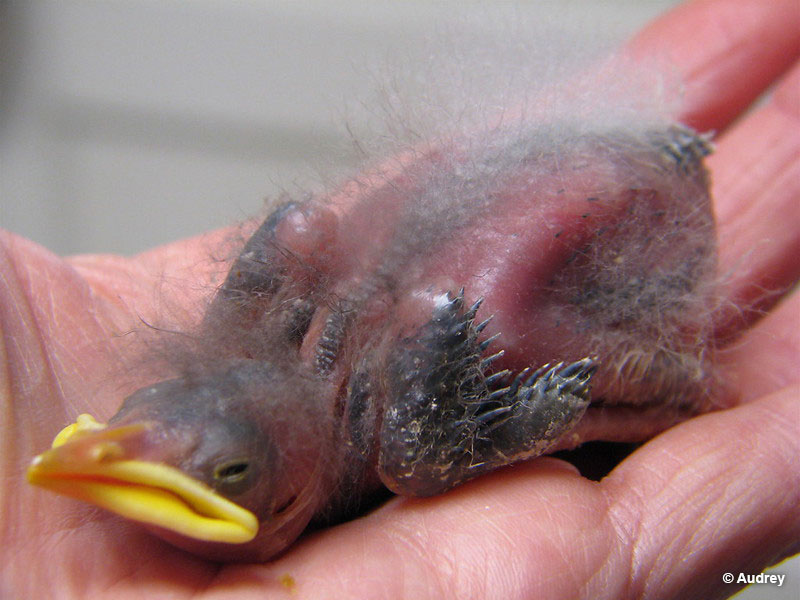
As for fledglings, returning them to the nest likely won’t do any good since they have a drive to leave it again. Thus, even if you make an effort, the chick will likely resume where it left off the last time it “escaped” from the nest.
Is the baby bird in a safe spot?
If the fledgling is on the ground in a really unsafe location, it is perfectly reasonable to interfere by moving it to a safer spot right next to where you found it. For example, if it’s on the pavement in a busy spot, try moving it into a nearby green area, ideally on the shrub or right under it. Just remember that the birdie needs to stay within the parents’ reach.
Take cover and observe what happens
Are parents coming back to feed the brood or the fledgling (a word of warning – a couple of hours can pass between two feedings)? Are there adult birds of the same species around? If the answer is yes, the chick will likely be fine without any intervention.
If the parents are not returning for hours or you notice dead birds that could be of the same species, contact your local wildlife organization to see about possible further steps.
For additional steps or so-called troubleshooting, see the RSPCA guides for nestlings and baby birds.
Limit access to pets
Cats and dogs can easily kill even a healthy fledgling, and there is not much parent birds can do about it. In fact, cats will actively stalk baby birds near the ground. One of the greatest favors you can do for young birds is to keep your cat indoors, especially during the nesting season. Also, do not let your dog roam without a leash in natural areas during the nesting season.
If your cat has brought in a baby bird as prey, this is a medical emergency for the bird – please contact your local wildlife center or a veterinarian. Even the slightest bite wound can cause blood poisoning in birds; an experienced veterinarian needs to treat the victim with antibiotics to survive!
If you have bird nests on your property but have trouble with neighborhood cats, consider using commercial cat deterrents to keep the cats away from vulnerable birds or their nests.
When should you look for professional help?
As soon as you determine that the baby bird is definitely an orphan, you should reach out to professionals. Licensed wildlife rehabilitators are trained to raise wild animals in a way that maximizes their chance of survival in the wild.
Also, feeding schedules and extra care for these creatures can be highly time-consuming and burdensome for an average person.
It is always preferable to let wildlife rehabilitators raise the birdie than an amateur, no matter how loving and well-meaning.
Even if you’ve successfully raised the bird from hatchling to fledgling yourself, the rehabilitators need to “rewild” it before they release it back into nature.
If you don’t know who to call already, you can do a web search for “wildlife rehabilitation” plus your state. The Humane Society of the United States also has a page to help people find a local wildlife rehabilitator.
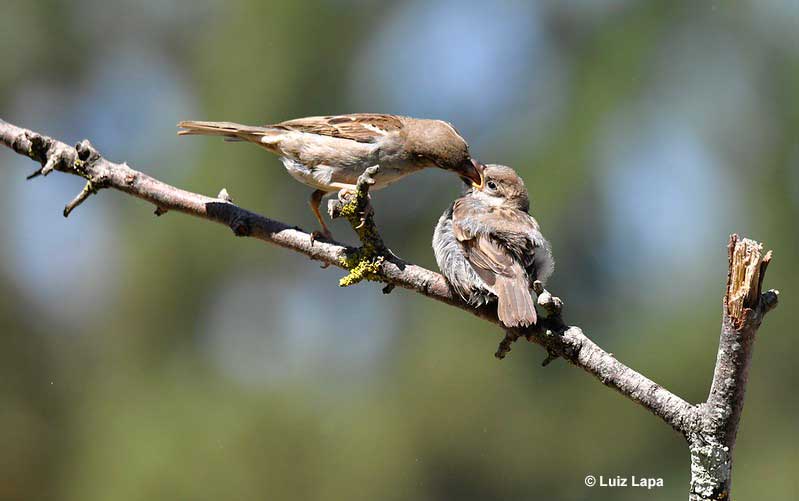
FAQ
Will a mother bird reject her baby if touched?
Fortunately, parent birds don’t reject their chick because humans have handled them. Even if your touch has left a foreign smell on their bodies, birds don’t recognize their babies by smell, so it won’t make much difference.
However, hanging around the nest, touching it, or photographing it may cause parents to abandon the entire brood. It doesn’t happen because of the smell or other human traces. Simply, parents don’t want to invest their energy if a large predatory creature (in this case, a human) has obviously spotted it. Because of that, we advise you not to disturb nests or nesting areas. The less human activity near the nest, the better.
How can you tell how old a baby bird is?
The precise age is not as important, but it is useful to distinguish whether the baby bird is a nestling or a fledgling. Nestlings have scarce downy feathers, they can’t move around on their feet or grasp branches (or fingers) with their toes, and they don’t look strong and active.
Fledglings are baby birds growing adult feathers that can already move on their feet and leave the nest, although they may still be unable to fly. The difference is important because most fledglings you may happen to find on the ground or in the shrubs still have their parents around to feed and protect them outside of the nest.
Nestlings, on the other hand, have likely fallen out or have been otherwise abandoned, with no chance of surviving if just left there.
Do newly hatched birds have a chance of surviving on their own?
In the case of altricial birds whose chicks hatch blind, naked, and unable to move around, hatchlings or nestlings stand no chance of surviving independently. They can’t fend for themselves and need diligent parental care.
For precocial birds like pheasants and peafowl, the odds are also slim. Despite their mobility and development, they are highly vulnerable to predators when there are no parents to guide them.
Should you take orphaned birds under your care?
Even if you are 100% sure that the baby bird is orphaned, the short answer is no. Orphaned birds should be taken care of by professional, licensed wildlife rehabilitators.
You should consider taking an orphan chick under your care only if you are absolutely sure there is no way to get the bird back to its parents, and there are no wildlife rehabilitation centers within a reasonable/reachable distance.
If you manage to raise a wild bird on your own, your responsibility is to prepare it for life in its natural surroundings the best you can. Handle the bird as little as possible, and don’t expose it to too much human company.
At the same time, ensure access to appropriate natural branches and other organic surfaces to help with foot development. Contacting your local wildlife rehabilitation center for help makes sense, even if at the very end, before the release. They will likely house it with other rescues in a semi-natural environment to help it gain skills to navigate the wilderness before the release.
Attaching yourself emotionally to the bird you raised is normal, and you may be tempted to keep it in the household as a pet. However, this would be a torturous life for a wild bird. In this case, the saying “If you love them, let them go” applies 100 percent. Healthy and capable rescue birds should always return to their natural habitats.
What to feed an orphaned baby bird?
The food for orphaned baby birds differs depending on the species. There is no one-size-fits-all baby bird diet. For example, some chicks will eat only insects (and need quite a diversity to remain healthy), while pigeon babies need a special mushy mixture that replaces pigeon crop milk.
All the nutritional specifics are another reason why raising orphaned chicks is best left to professional wildlife rehabilitators or biologists.
Is it ok to walk out on an orphaned baby bird?
Most biologists would say yes. As cruel as it sounds, orphaned baby birds are often victims of natural selection. It has shaped the evolution of their species, ensuring that only healthy and capable birds pass on their genes. Except in the case of obvious nest disturbance, we can’t be sure why the baby bird was rejected by its parents or pushed out of its nest in the first place.
However, most bird and animal lovers can’t simply walk away from a needy baby bird. This is perfectly normal and shows a high personal degree of empathy.
Don’t worry – rescuing one baby bird won’t harm the natural selection process.
Still, if you choose to intervene, you must take the right steps to secure the future of this baby bird instead of just letting your feelings (mis)guide you. After a successful rescue, however, feel free to enjoy that deep emotion of joy and gratitude for helping save the life of a precious avian creature.
